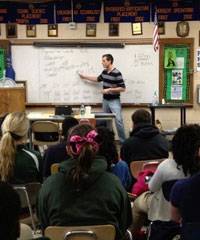02/12/2013
He says meeting Norman Borlaug was the most important thing to ever happen to him. Now Kautzky looks to carry on Borlaug's legacy. 'I hope I've done him justice,' he says.
 |
| Keegan Kautzky discusses global hunger with students |
Source: The Des Moines Register
As a childhood veteran of long days shoveling manure during the farm crisis in the 1980s, Keegan Kautzky was ready to put agriculture in the rearview mirror when he left the family farm near Perry and headed to Iowa State University.
Things were moving right along as he completed his freshman year. A business degree was in the works. Then the forceful yet kindly words of an Iowa icon exploded Kautzky’s future.
“Norman Borlaug looked me in the eye and said ‘You aren’t doing enough,’ ” said Kautzky, now 31. “He told me I needed to go home, think about it and figure out how I was going to get to Africa.”
Kautzky wasn’t even supposed to be interning at the World Food Prize when Borlaug, its inspiration and founder, pulled him aside. It was only when another educational opportunity on his calendar fell through that a last-minute decision was made to fill the void.
Now a man who literally helped keep entire continents from starving had planted himself deep into Kautzky’s heart after a single conversation.
Africa it would have to be.
Lightning in a bottle
Time spent pursuing both his undergraduate and master’s degrees in Malawi, India and South Africa ultimately brought Kautzky back to the World Food Prize in Des Moines, where he now serves as the director of national education programs. His task is both simple and monumental: to capture the kind of lightning in a bottle that Borlaug triggered in him, and pass it on to the next generation of world-changers.
Ambassador Kenneth Quinn, the president of the World Food Prize, was the one who picked up the phone in 2008 to ask Kautzky to return from his four-year stint in South Africa, where he earned master’s degrees in development studies, public health and epidemiology.
Ten more years of doctoral research could have kept Kautzky in South Africa indefinitely. Yet somehow, returning to Iowa was the logical extension of the very same dream that had taken him to some of the farthest corners of the world.
“I knew the passion Keegan had for our issues, and he had been inspired directly by our founder,” Quinn said. “That counted for a huge amount. The commitment he has to carry on Norm’s legacy is priceless.”
'The bigger picture'
The thing about Kautzky is that he wasn’t exactly wasting his life when Borlaug, the Nobel Peace Prize winner who died in 2009, got ahold of him. He was an honors student, he had started his own nonprofit to promote volunteerism while in high school, and his parents’ adoption of two black children in rural Perry had already made an indelible impact on him concerning the need to help others.
“I probably would have done some kind of nonprofit work in Iowa if I had never talked with Norm, but I would never have understood the bigger picture,” Kautzky said. “Norm said I wouldn’t really be of any use to anybody unless I truly understood the world’s problems from up close.
“I hope I’ve done him justice. Meeting him was the most important thing that ever happened in my life.”
Because of Borlaug, Kautzky not only learned about agroforestry in Malawi but also saw how families with limited educational resources approach their education. In a land of 12 million people, only about 400 new students or even fewer are admitted to college each year, and once accepted, their access to textbooks is so limited that college students can only check them out to study for about an hour each week.
Because of Borlaug, Kautzky spent time working in an orphanage in India and found that getting children off the street often meant taking in their grandparents as well. The generation in between was nowhere to be found, and the children were doing what they could to feed and provide for their elders.
Because of Borlaug, Kautzky also spent a year working for Refugees International in Washington, D.C., where he helped in the wake of the 2004 tsunami that rocked southeast Asia. His main focus was to help displaced children in Sri Lanka. Many had been targeted by the terrorist group known as the Tamil Tigers and forced to become child soldiers.
Clearly, this wasn’t your average undergraduate political science degree.
“Keegan was on a moral path as well as an intellectual path,” said Liz Beck, the former director of Iowa State University’s honors program. “If he could wrap his arms around the globe, he would do it. His frustration is that he can’t do enough.”
Passing it on
The mandate of the World Food Prize to do more is why Kautzky has reached into 26 states thus far on the way to implementing high school programming and curricula nationwide.
Getting kids who might normally study medicine or the law to consider a career in entomology or agronomy is part of that initiative — not because studying medicine and law aren’t worthy endeavors, Kautzky said, but because disciplines such as crop genetics need to be better understood for the global game-changers that they are.
End malaria. Eliminate malnutrition and starvation. Alter the course of millions of lives.
“Unless we treat students like they should have an expectation to give their lives to something big, they won’t,” Kautzky said.
Sound familiar? Norman Borlaug clearly lives on.



